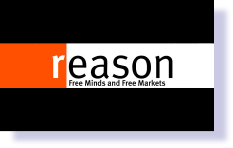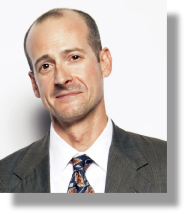 A Traitor to the War on Drugs
A Traitor to the War on Drugs
By: J.D. Tuccille
April 6, 1998
Think that Proposition 215 made life groovy for sick Californians who might find
a toke of wacky weed to be a bit therapeutic? Think again. At least one AIDS patient
has played host to the nimble home redecorators of the Drug Enforcement Administration
as a consequence of exercising his new-found right to ease his discomfort with a
little marijuana ? and also, apparently, for publicly speaking out for the right
of others to do the same. That?s right, best-selling author Peter McWilliams isn't
just a smoker; in the eyes of the armies of pharmaceutical righteousness, he's a
traitor in the War on Drugs.
McWilliams is a well-known writer, having hit the bestseller lists several times
over the years with such books as Ain't Nobody's Business If You Do, a tome that
(in a nice change of pace, these days) urges people to leave each other the hell
alone as long as nobody's getting hurt. That's a good message, and one that should
be pounded into most politicians' skulls with the business end of a shark bat. Although,
I suppose, that would hurt. 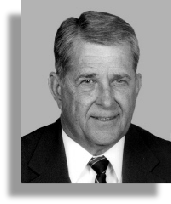
Good.
That sort of dissent alone can incur federal wrath --- not too long ago, Rep. Gerald
Solomon (Cretin, NY and pictured, right) proposed pulling the non-profit status of
such groups as the Cato Institute and the Drug Policy Foundation for their heretical
opposition to the great anti-drug crusade. After all, free Speech is for the right
speech, goddamnit.
But McWilliams' advocacy of greater pharmaceutical freedom took a personal turn in
1996 when he was diagnosed with AIDS. He donated office space to a cannabis club,
popular organizations in California that sell marijuana to cancer and AIDS patients
and other worthy recipients, he started an online publication called Medical Marijuana
Magazine that championed legalization, and his written and spoken advocacy started
popping up in all sorts of public venues.
McWilliams himself thinks that he finally pushed the drug warriors to distraction
with one of two actions: His financial support for Todd McCormick, a cancer patient
who grew pot and became the first medical marijuana user arrested after Prop. 215's
passage, and an 'open letter' he placed in Variety, the Hollywood must-read, two
weeks before the raid, attacking the DEA's top cop for attempting to chill, with
legal threats, any unapproved treatment of disfavored drugs in the media.
Whatever the reasons, in December of 1997, McWilliams entertained a pre-dawn raid
by federal drug cops at his home, while their colleagues tossed the offices of his
publishing company. The feds' unhappiness with such criticism of their holy crusade
as that posed by McWilliams was made clear by the inclusion of that omnipresent government
hit man -- an IRS agent -- in the raiding party. It became even clearer when the
raiders carted away McWilliams' computer with the manuscript of a pro-legalization
book on the hard drive.
Now, it's unlikely that the DEA expected to silence McWilliams himself. The threat
posed by the author's health is likelier a nastier torment than anything that even
modern, sophisticated federal agents are likely to inflict. Besides, McWilliams has
already endured drug charges from authorities in Michigan, where he was busted at
the airport in 1997 for carrying a personal-use quantity of marijuana. The experience
has left him decidedly unrepentant -- while leaving prosecutors more than a bit tentative
in their assault, in light of that state's once relatively sensible legal stance
on medical cannabis (yes, we know this used to be considered a good thing, but now
it's a bad thing -- because we say so).
But such assaults, while sometimes leaving their targets unbowed, can have 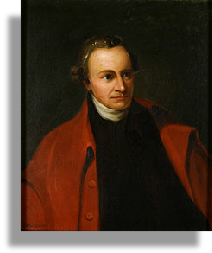 a clear
deterrent effect on folks with less steely backbones, or more to lose. For every
crusader willing to stand up and quote Patrick Henry (pictured, right), (while sucking
smoke from a bong -- quite a feat and one not to be missed), there are many more
regular folks who'd just rather not have the door kicked in, the cat stomped and
the sock drawer emptied for the world to see. It is an awful lot of aggravation.
a clear
deterrent effect on folks with less steely backbones, or more to lose. For every
crusader willing to stand up and quote Patrick Henry (pictured, right), (while sucking
smoke from a bong -- quite a feat and one not to be missed), there are many more
regular folks who'd just rather not have the door kicked in, the cat stomped and
the sock drawer emptied for the world to see. It is an awful lot of aggravation.
And even willing martyrs know that for every Peter McWilliams, there's an unknown
host of hemp-clothed Nathan Hales who don't have the public stature to gain the support
of the ACLU and William F. Buckley, and consequently get slightly less courteous
treatment from the local ninja-suited Waco squad. (Rat-at-at-at. Come out with your
hands up! Rat-at-at-at.)
In the months since the raid, McWilliams has finally regained his computer, with
the book manuscript somewhat the worse for wear. Whether or not he'll face federal
charges is uncertain (the Michigan charges are still pending, though). To his credit,
he's actually working on another book inspired by the DEA raid -- something that
the feds probably didn't have in mind when they handcuffed him and carefully sat
him in his bathrobe as a one-man audience to a Gestapo tea party.
But as resilient as McWilliams has been, and as much support as he has gained, the
raid may well have have had its intended effect: every onlooker now knows that the
feds will suffer no traitors to the War on Drugs.
"One has a moral responsibility to disobey unjust laws." - MLK
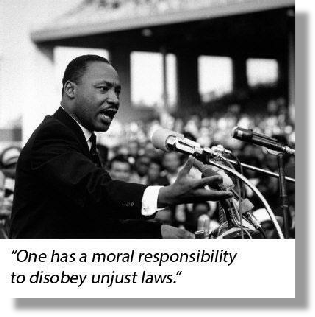


 A Traitor to the War on Drugs
A Traitor to the War on Drugs
 a clear
deterrent effect on folks with less steely backbones, or more to lose. For every
crusader willing to stand up and quote Patrick Henry (pictured, right), (while sucking
smoke from a bong -- quite a feat and one not to be missed), there are many more
regular folks who'd just rather not have the door kicked in, the cat stomped and
the sock drawer emptied for the world to see. It is an awful lot of aggravation.
a clear
deterrent effect on folks with less steely backbones, or more to lose. For every
crusader willing to stand up and quote Patrick Henry (pictured, right), (while sucking
smoke from a bong -- quite a feat and one not to be missed), there are many more
regular folks who'd just rather not have the door kicked in, the cat stomped and
the sock drawer emptied for the world to see. It is an awful lot of aggravation.

